I read the book below and either learned useful ideas or found creative inspiration or both, which means now you can:
Take my notes and assorted excerpts for your own use
Decide if it looks good enough to buy for yourself
Buy a copy for someone else
1. is a time saver 🕰
2. is a recommendation source 📌
3. is a gift idea generator 🎁
Have at it and if you have feedback or thoughts I’d love to hear ‘em. :)
—Mark
“Pronouns, articles, prepositions, and a handful of other small, stealthy words reveal parts of your personality, thinking style, emotional state, and connection with others.”
—The Secret Life of Pronouns: What Our Words Say About Us, by James W. Pennebaker
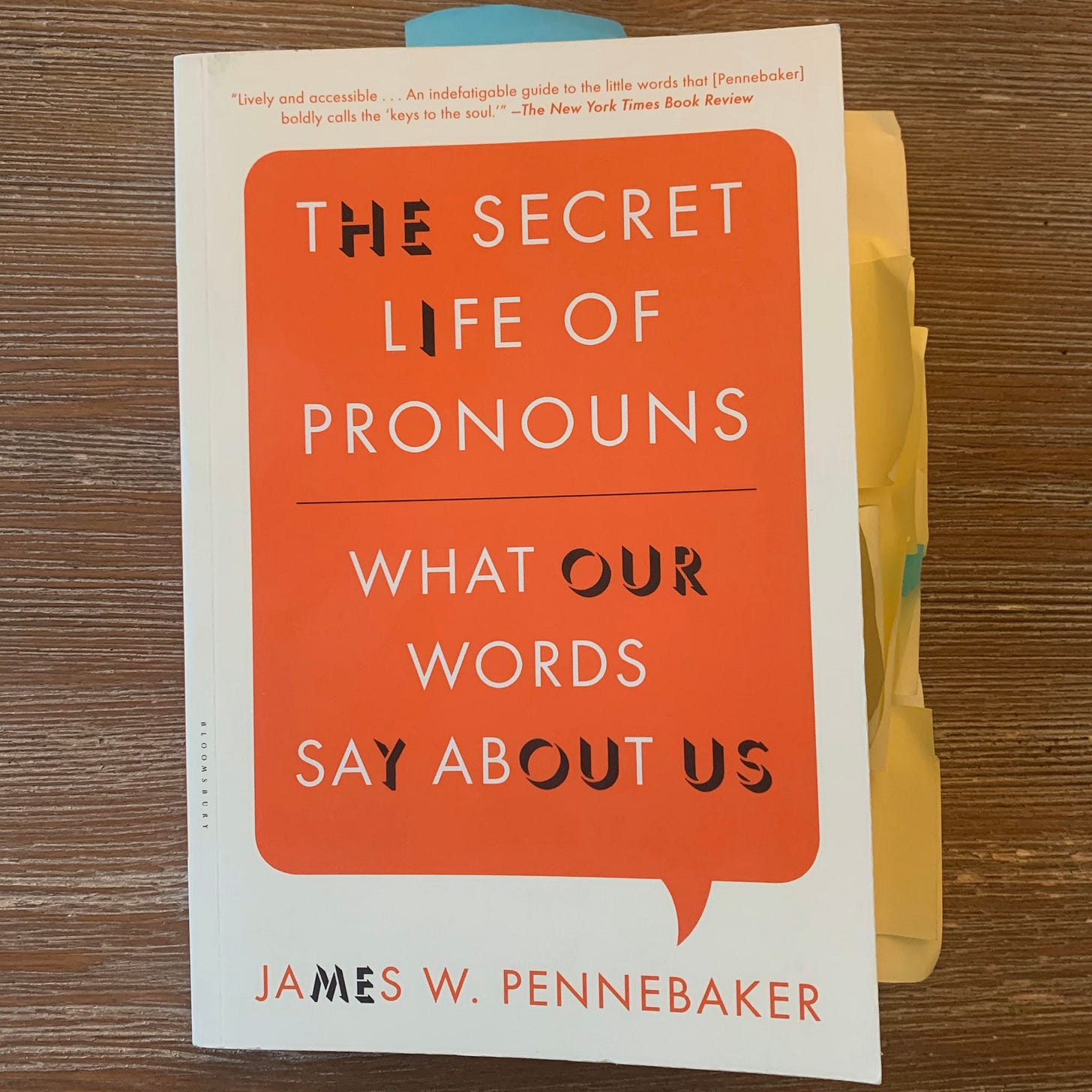
This books spans a number of insights, from statistically consistent gender-based tendencies, to indications of power and dominance, to subtleties around honesty and deception:
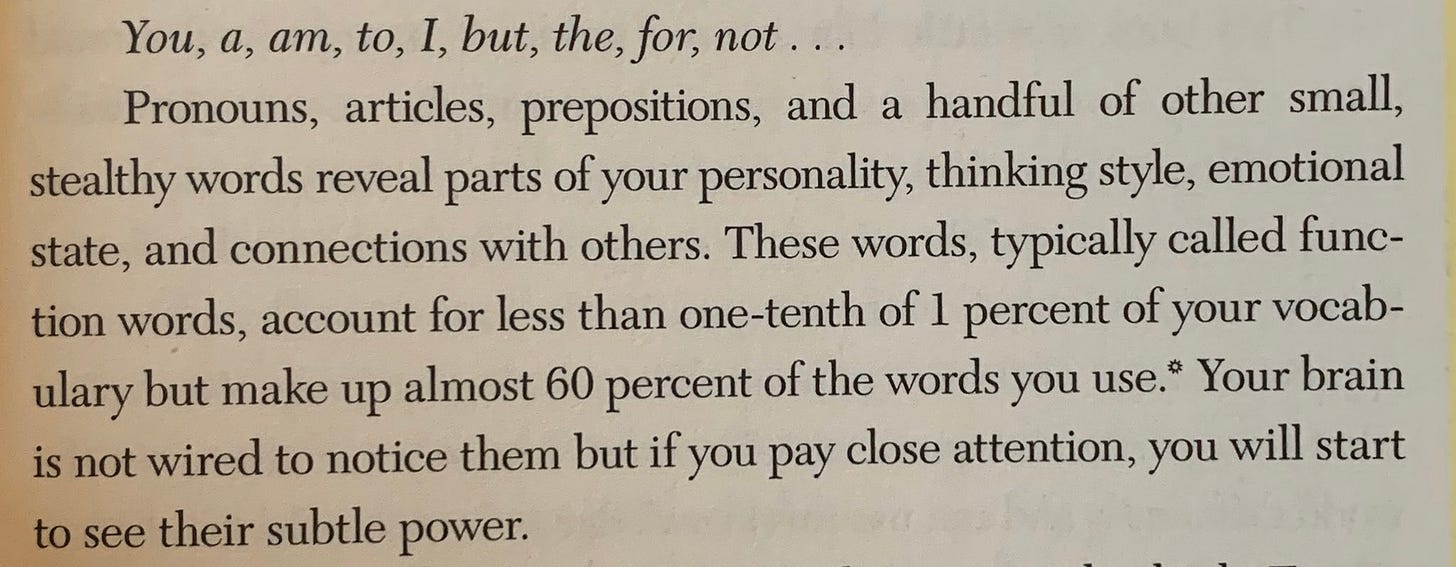
For example, in discussing “I-words” (me, my, etc.), the author notes that most well-adjusted people tend to regularly alternate between using them and using other pronouns (they, her, you…) showing a balance between inward-focus and active acknowledgement of others.
“In other words, healthy people say something about their own thoughts and feelings in one instance and then explore what is happening with other people before writing about themselves again.” 👇
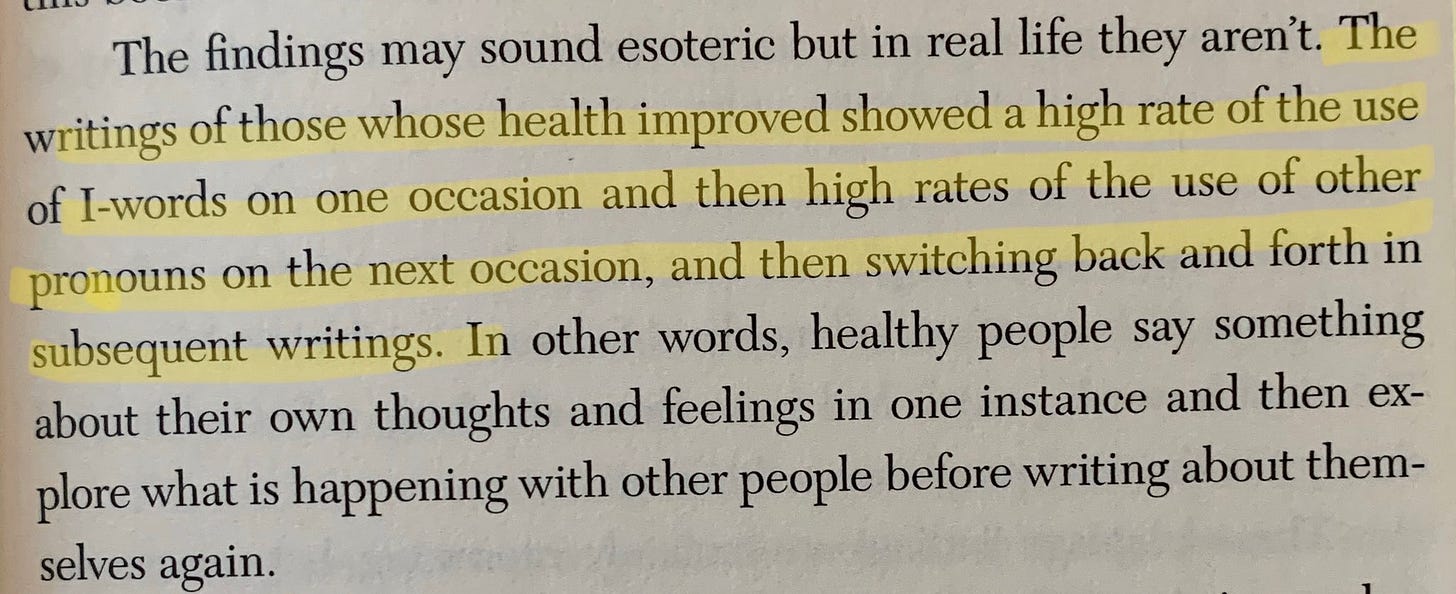
While this insight might seem somewhat obvious, a much more fascinating thing is going on with the use of articles. (a, an, the…)
“Across hundreds of thousands of language samples from books to blogs to everyday informal conversation, men consistently use articles at higher rates than women.” And, even taking people’s sex into account, high article users tend to be more organized and emotionally stable.” 👇
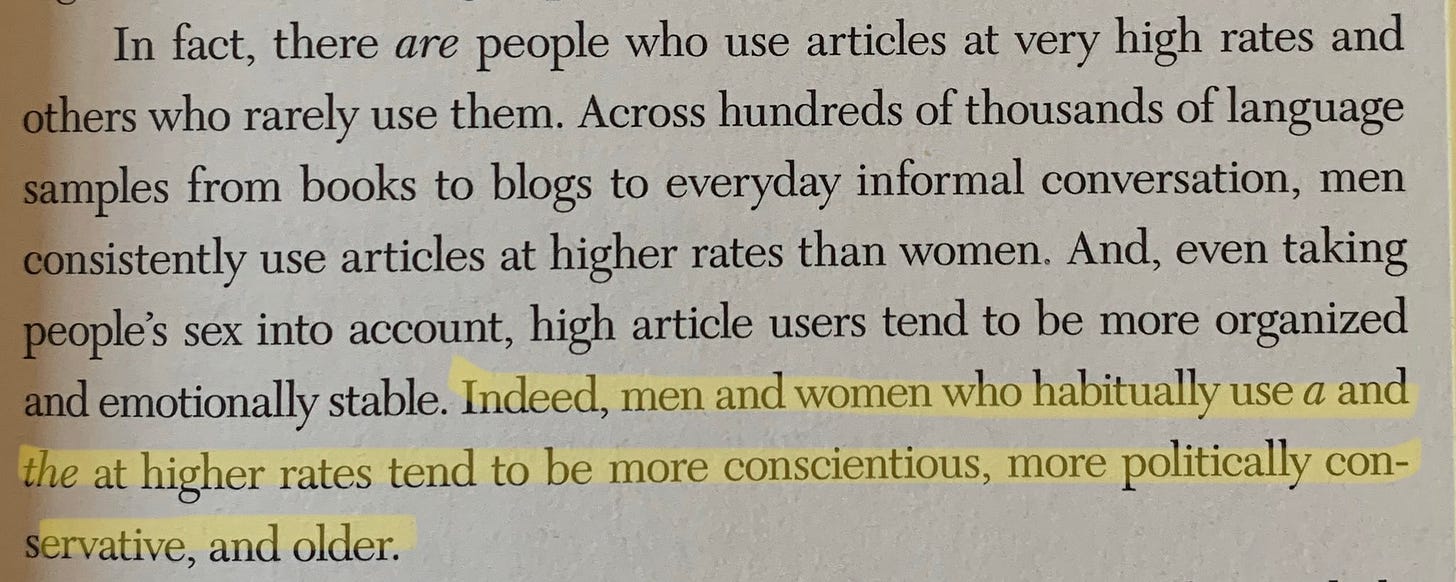
The statistical strength and predictive power of these patterns has been well-established at this point (the book was first released in 2013, the culmination of decades worth of primary research by the author), but what’s more interesting is why these are such reliable patterns.
For example, one might assume a higher use of first-person singular pronouns might be most associated with self-centeredness or narcissism, but it actually reveals self-awareness, and a higher awareness of feelings and emotions—inward states of being—in general.
“Women use the first-person singular pronouns, or I-words, more than men.” 👇
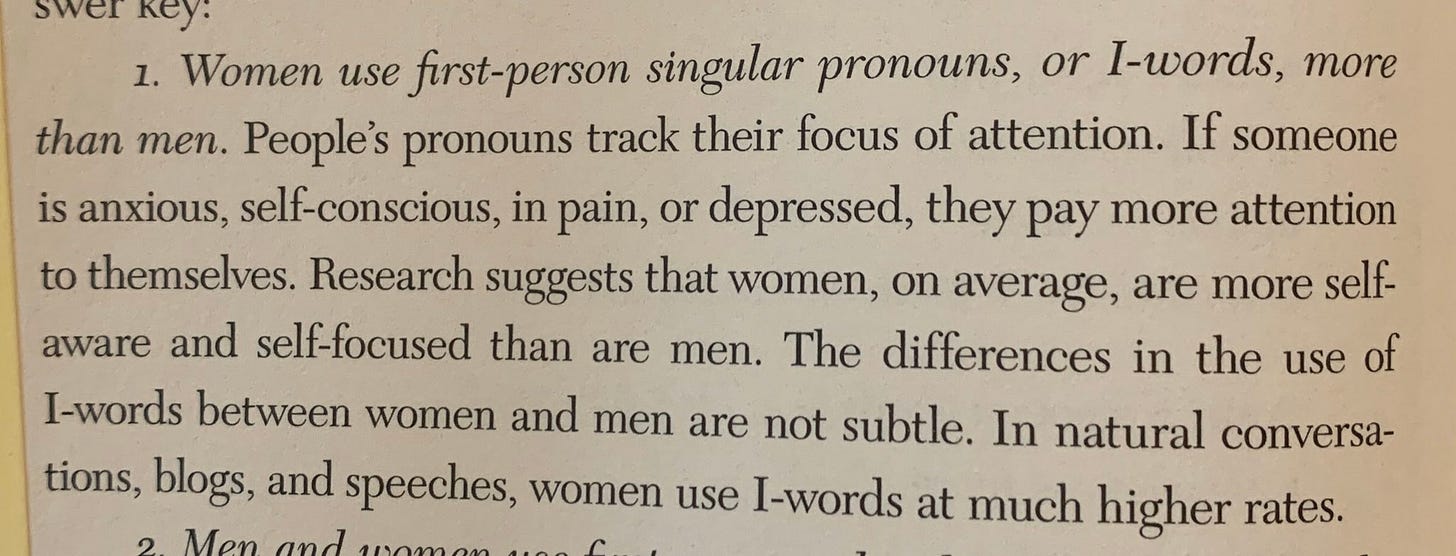
“the fact that men consistently use more articles, nouns, and prepositions *is* news […] because these language differences signal that men tend to talk and think about concrete objects and this in highly specific ways.”
“Further, the use of prepositions signals that the categorization process is being done in hierarchical and spatial ways.” 👇

There are also predictable patterns of sentence constructions seen in various levels of power (or perceived power) in a group, regardless of gender:
“why would those with more authority use more noun-related words? And, equally important, why would lower levels of power be associated with the use of more verbs and pronouns?” 👇
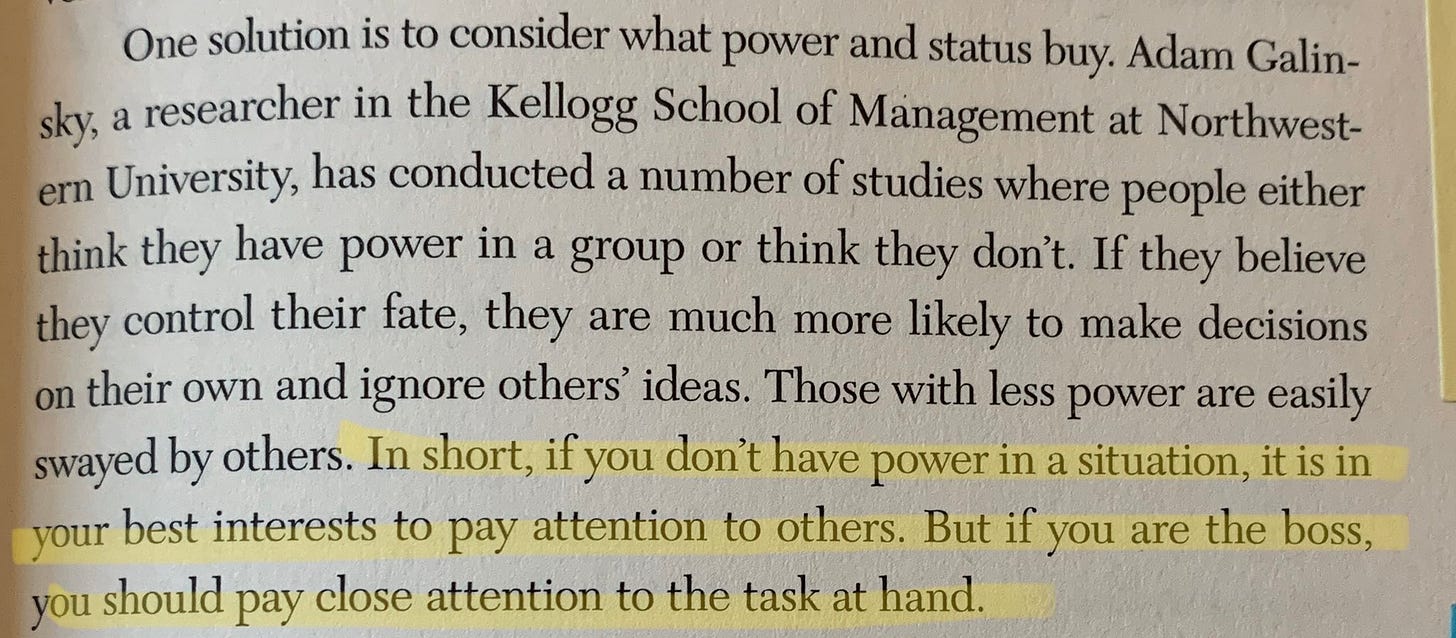
Task-oriented thinking results in the use of fewer verbs and pronouns due to the lack of social awareness needed while focused on the job at hand:
“As noted in the last chapter, when people are task-focused they don’t pay attention to themselves.”
“While signaling less status, the use of pronouns and verbs also suggests that speakers are more socially oriented. Most pronouns are, by definition, social.
Words such as we, you, she, and they tell us that the speaker is aware of and thinking about other human beings.”
We turn next to analytic thinking, which deals with notions of categorization.
“The factor of analytic thinking identifies people who work to understand their world. The hallmark of analyzing is making distinctions.” 👇
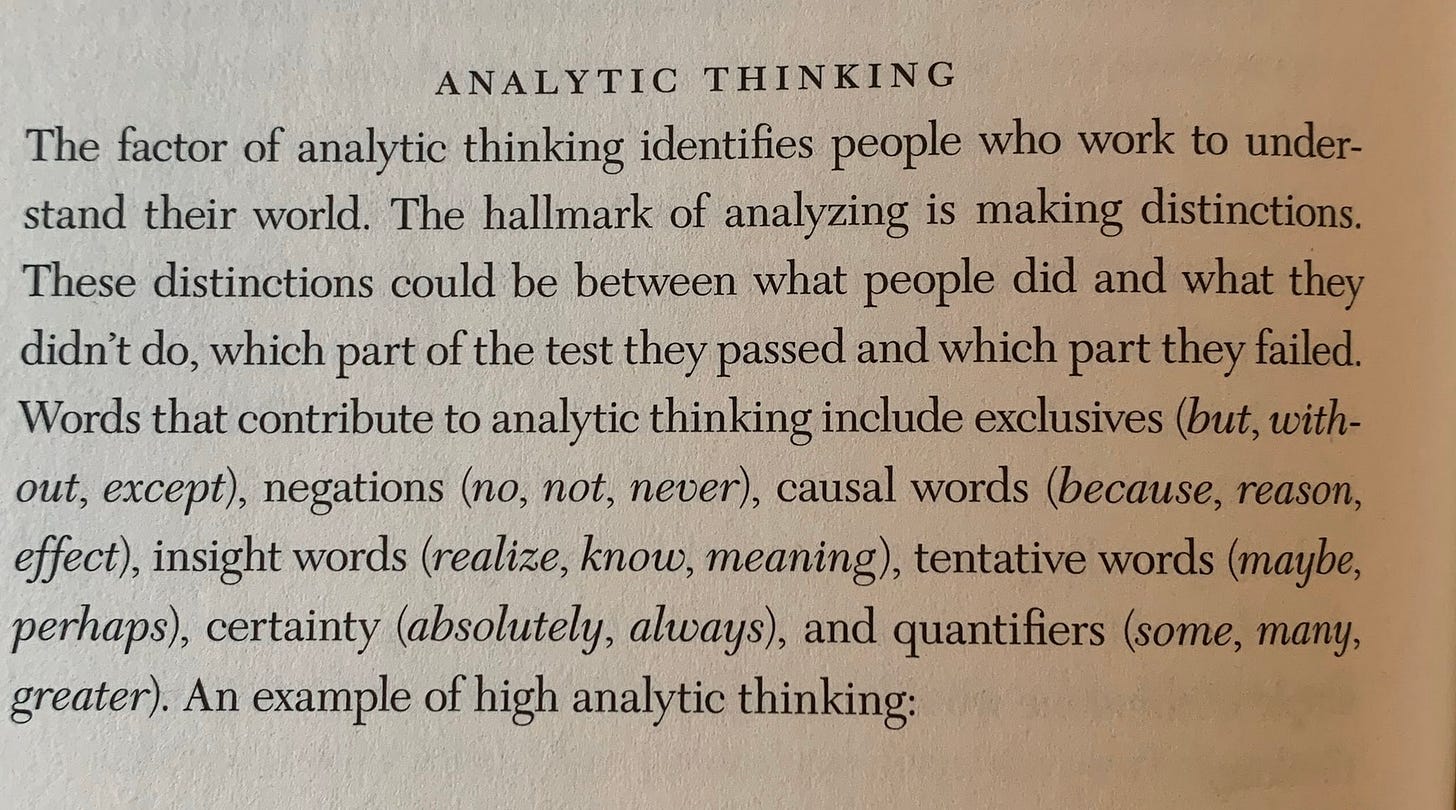
If you want people to feel closer to you, use the word ‘I’ more frequently:
“Recall from the second chapter the story about Senator John Kerry's aides urging him to use the word *we* more and *I* less in his speeches? His very bright group of advisers falsely assumed that a person who uses we in a speech makes listeners feel closer to the speaker.” 👇
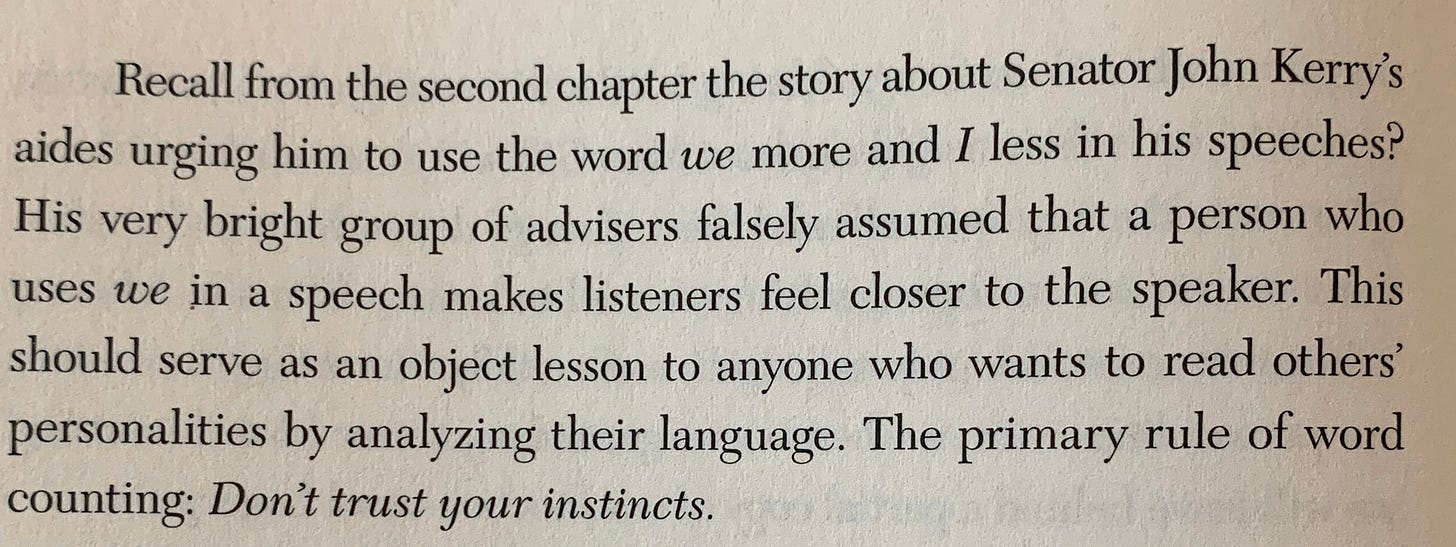
“Indeed, I’ve since learned that when someone changes the conversational direction, it serves as a powerful marker of what is on his or her mind.” 👇

The following quote captures a subtle insight: emotions are just expressions of how someone feels, they affect how they process reality itself:
“Counting emotion words is a fine start to measuring feelings but these approaches miss the central point: Emotions affect the ways people think”
Feeling down leads to introspection; happiness results in less rigorous thinking…
“When events happen to us that cause us to feel sad or angry, we tend to try to understand why they occurred. We use cognitive words that reflect causal thinking and self-reflection. Not true for positive emotions such as pride and love. When happy and content, most of us are satisfied to let the joy wash over us without introspection. In other words, negative feelings make us thoughtful; positive emotions make us blissfully stupid.”
The author also admits to some of these findings being surprising, even to him. He tells of his analysis of several letters of recommendation he wrote for students of varying levels of promise:
“This shocked me. The more potential I believed the student had, the *less* likely I was to use words like excellent, nice, good, and happy.” 👇
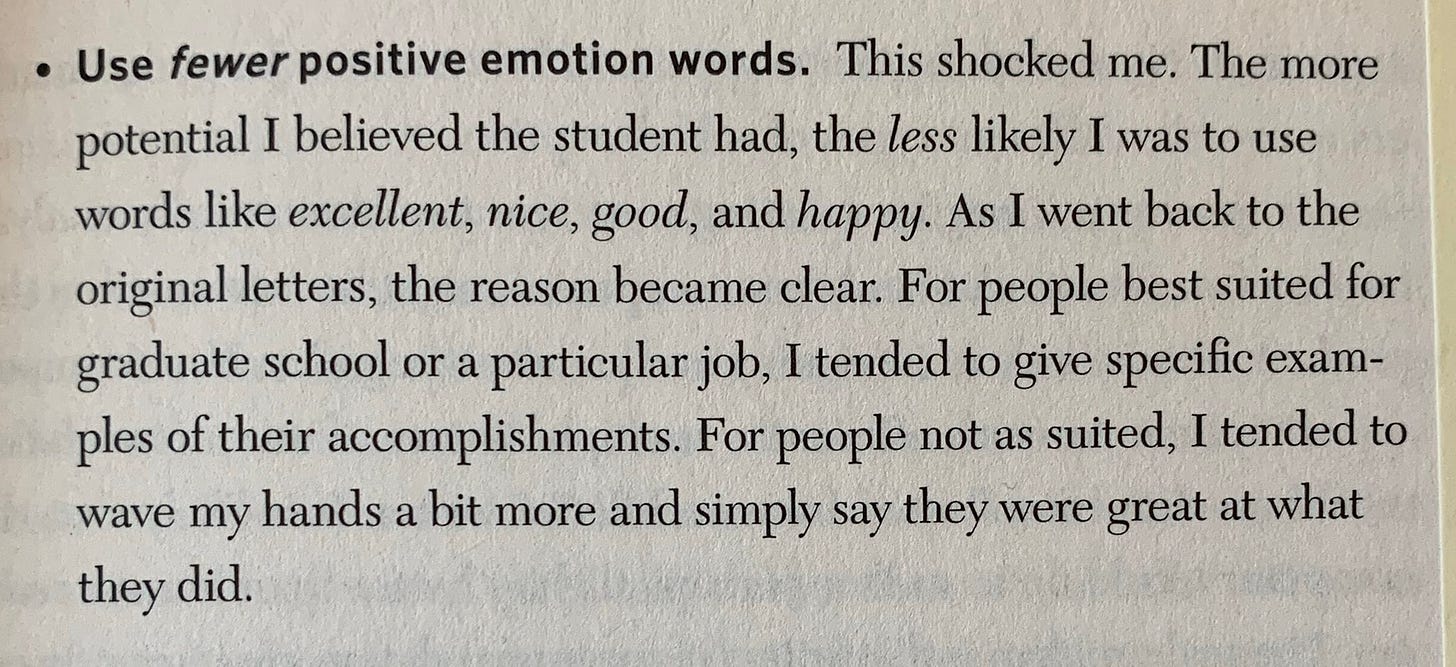
When analyzing language used in dating profiles, much can be learned about what isn’t mentioned…
“Although the function words distinguished honest from deceptive online ads, there were also differences in content words. […] people who were dishonest about their profiles tended to shift the focus of their self-description away from their sensitive topic. For example, women and men who lied about their weight were the least likely to mention anything about food, restaurants, or eating.” 👇
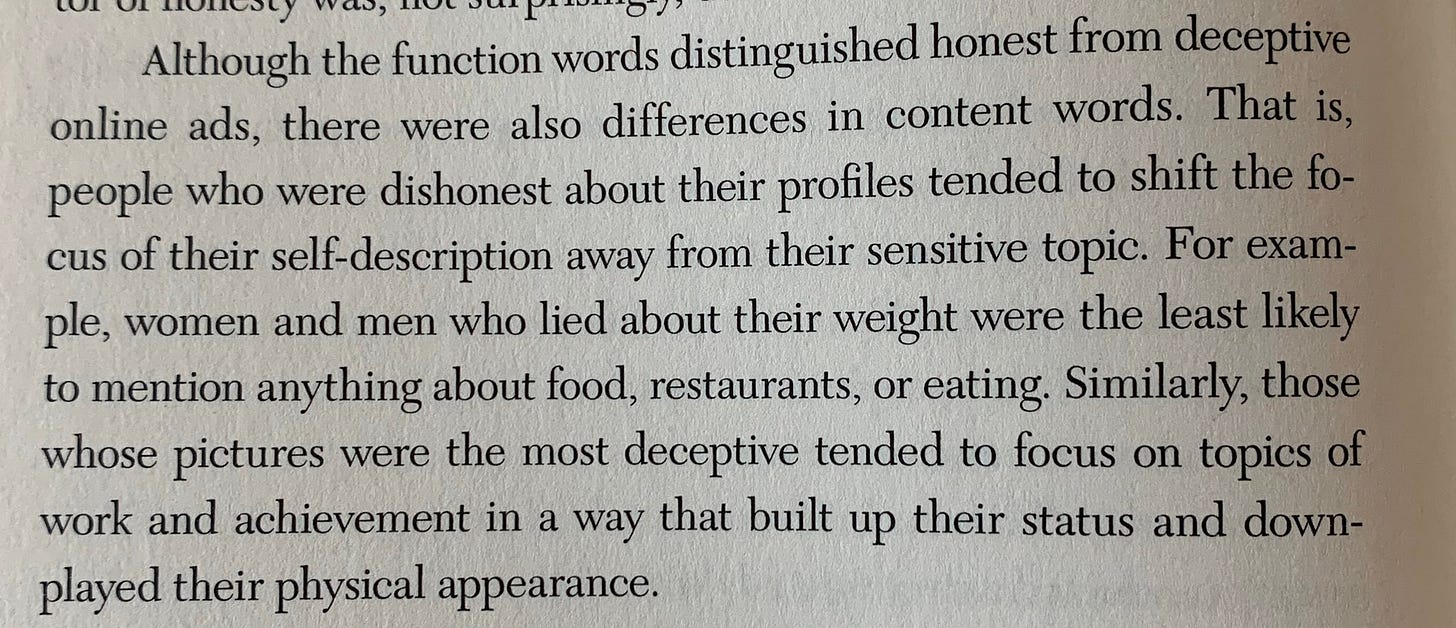
Turning to the topic of truthfulness and deception, less is (more) false:
“The stories that people generate when telling the truth are generally more complex than false stories.”
One of my favorite sections had to do with something called performatives. These are turns of phrase that we’ve all heard before (“I promise you…” “I’ll say it again:” etc.) but I’d never thought about why they’re used…
“Linguists and philosophers have long been intrigued by a language device called a performative. Performatives are statements about statements.” 👇
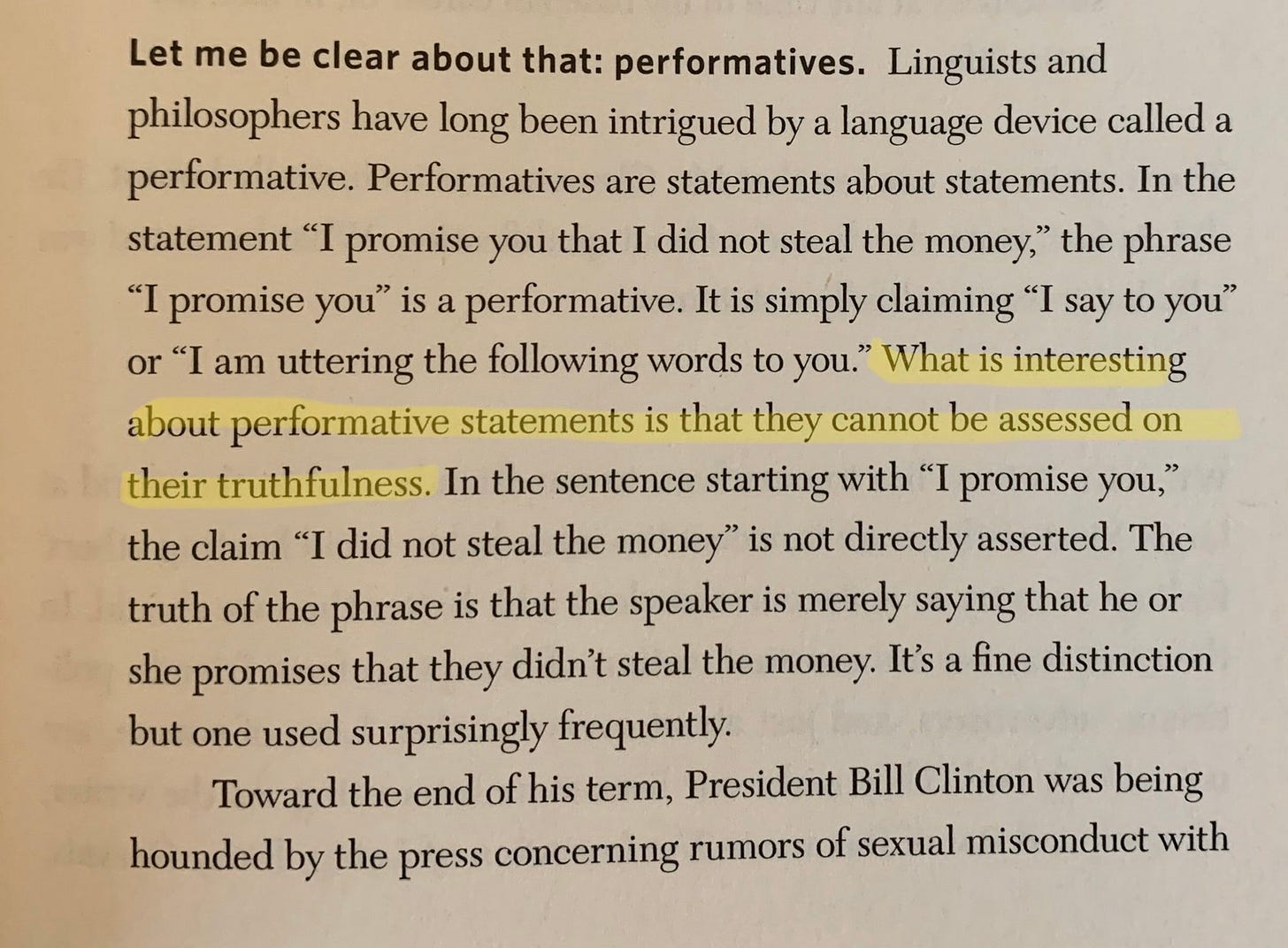
Bill Clinton’s infamous testimony regarding charges of sexual misconduct is a textbook example of the slipperiness of performatives in action:
“OK, so he later admitted that he had had sexual relations with ‘that woman’ but in the press conference, he was not officially lying.” 👇
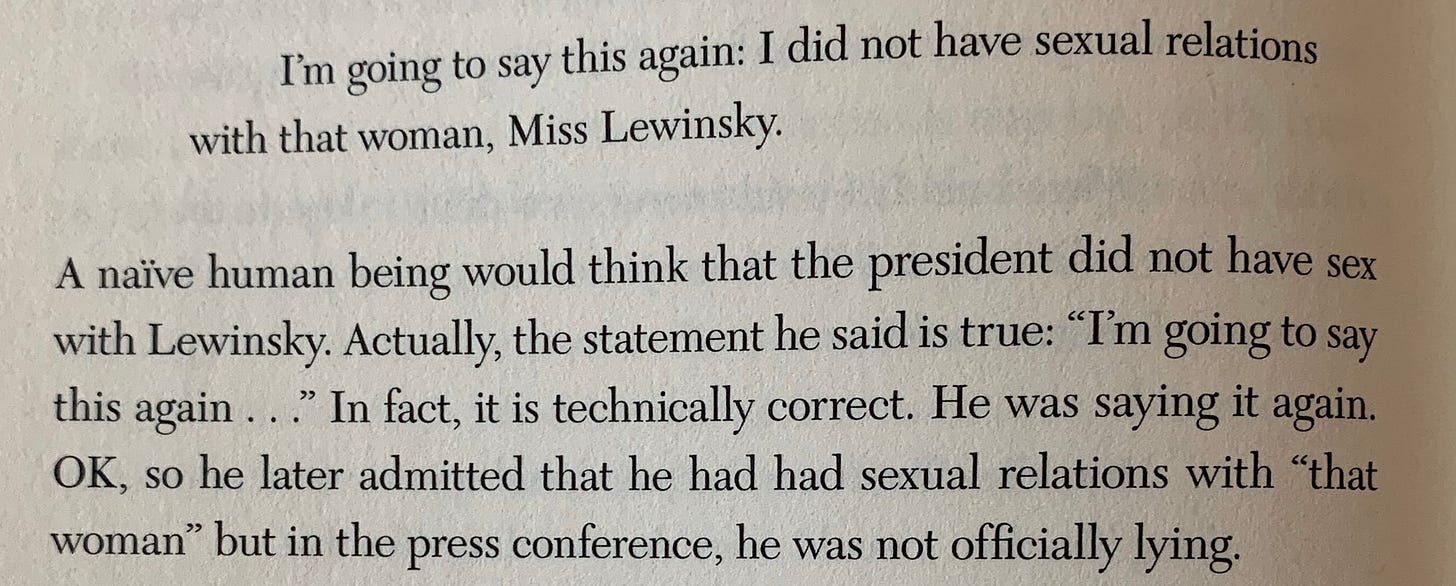
We turn next to social status:
“The grim truth is that to be a healthy human being you must be attentive to social status. Indeed, those individuals who are most successful and happy in life are particularly good at decoding and working within social hierarchies.” 👇
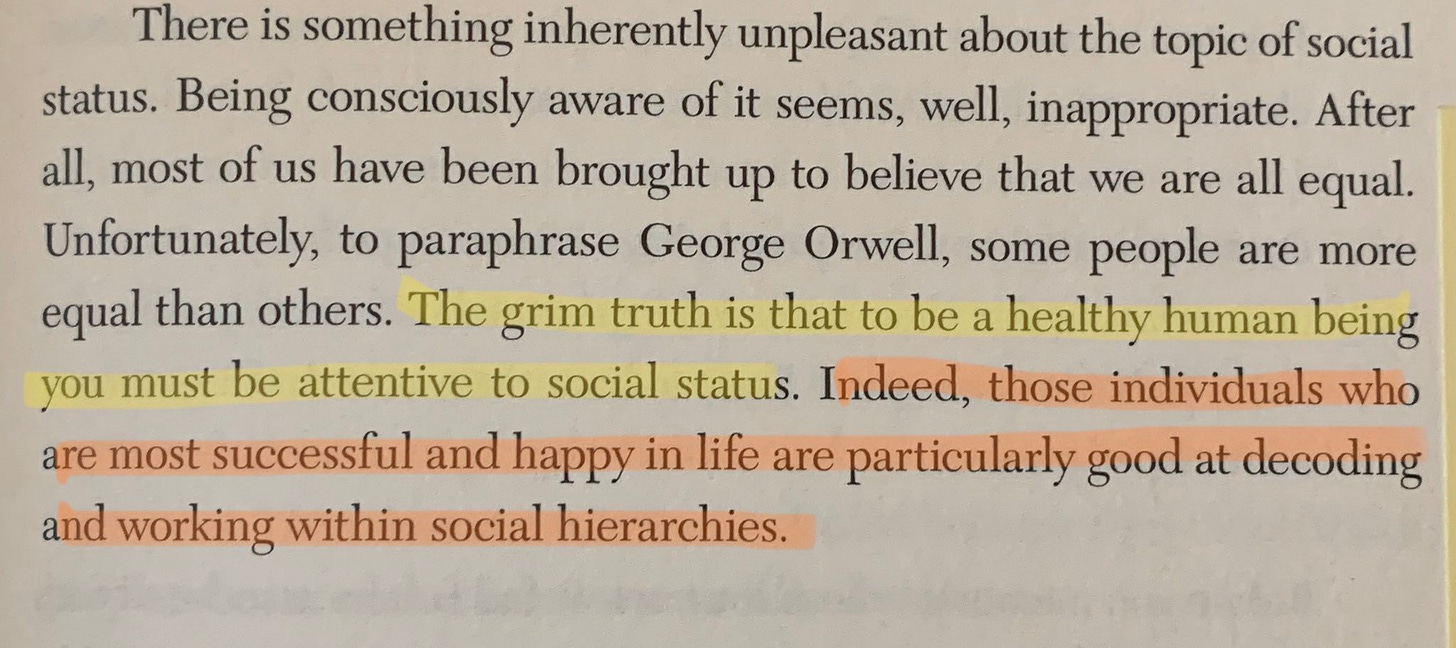
Take note of where speakers look when addressing an audience. It may reveal their own feelings of relative dominance or subservience:
“Those who are more dominant tend to look at their audience while they speak but look away while listening. Low-status people tend to do just the opposite. They focus on the speaker when listening but look away when talking. Where are they looking? Probably inwardly at themselves”
These feelings extend to differing uses of I-words as well, but take note: these studies suggest that it’s not that people who use fewer I-words find their way into leadership roles, but that people in leadership roles eventually start speaking like leaders:
Those who were assigned leadership roles ended up using I-words the least and you-words and we-words the most. In other words, people's language changes once they adopt a role. I can’t emphasize enough how important this finding is. Almost every other study that has been conducted with leadership and language was based on people who were already the leaders or who already had high status. This study indicates that the words reflect the leadership role. In other words, most people if thrust into a high-status leadership position will likely start to talk like a leader.”
In this way, words can be used as indicators:
“People can become better leaders by using their words as markers of how they are relating to others. Words are like a speedometer in a car that reflects how fast the car is going.” 👇
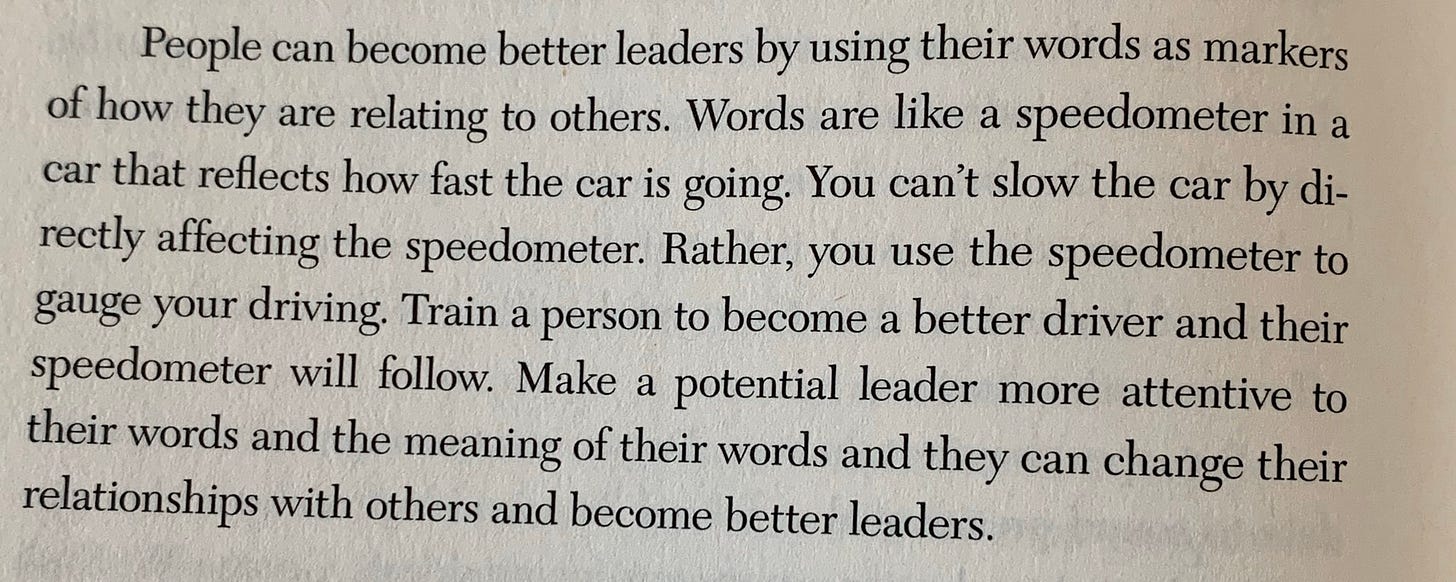
“Train a person to become a better driver and their speedometer will follow. Make a potential leader more attentive to their words and the meaning of their words and they can change their relationships with others and become better leaders.”
There’s also the topic of mimicry, where two people in dialogue will mirror one another’s body—and actual—language. This is actually an indication of perceptiveness and attention, not necessarily affinity:
“nonverbal mimicking was first thought to reflect how much the two people liked one another. In fact, it is a marker of engagement, or the degree to which the two are paying attention to each other.”
“If you are in love or you are outraged with your conversational partner, the two of you will match each other’s nonverbal actions precisely.”
Pronoun use also indicates how closely people feel something is to who they are as a person, for example when describing the company they work for:
“Management consultants sometimes distinguish among I-companies, we-companies, and they-companies.” 👇
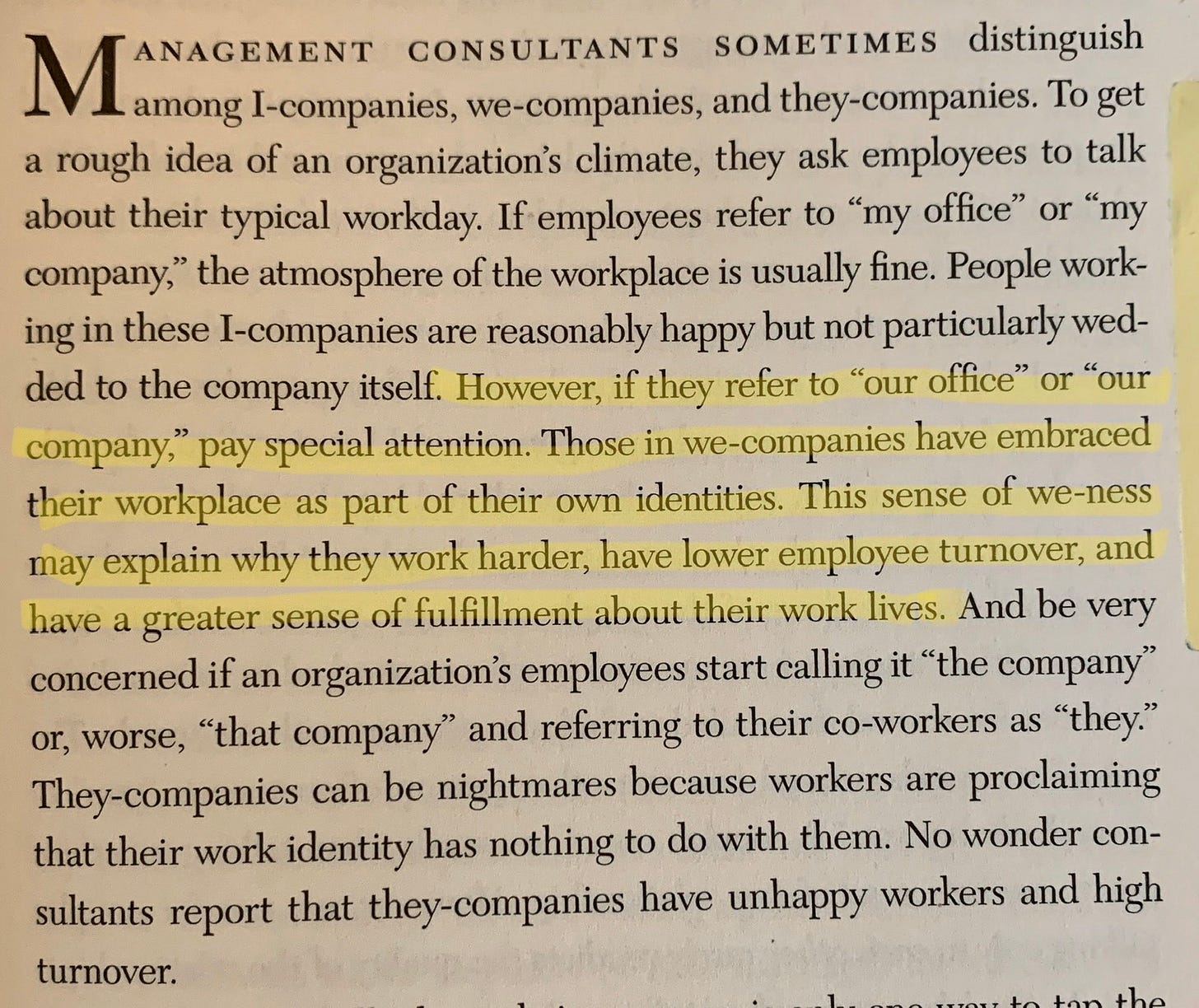
This also extends to sports teams. I-words tend to be used more often when a fan’s team wins:
“the interviewer asked about one of the two pivotal games in the season, ‘Can you tell me the outcome of that game?’
If their team had won, they usually answered, ‘We won.’ But if their team had failed to win the game, their answer was more likely ‘They lost.’”
“Taking partial credit for your team’s winning is a form of basking in reflected glory. Basically, we want to be close to groups that are successful and distance ourselves from losers.”
This may appear to be a form of “taking credit” for the win, but it actually suggest something more profound: that sports help us think about ourselves as part of something bigger:
“This is probably the allure of sports—they serve as an escape from the self.” 👇
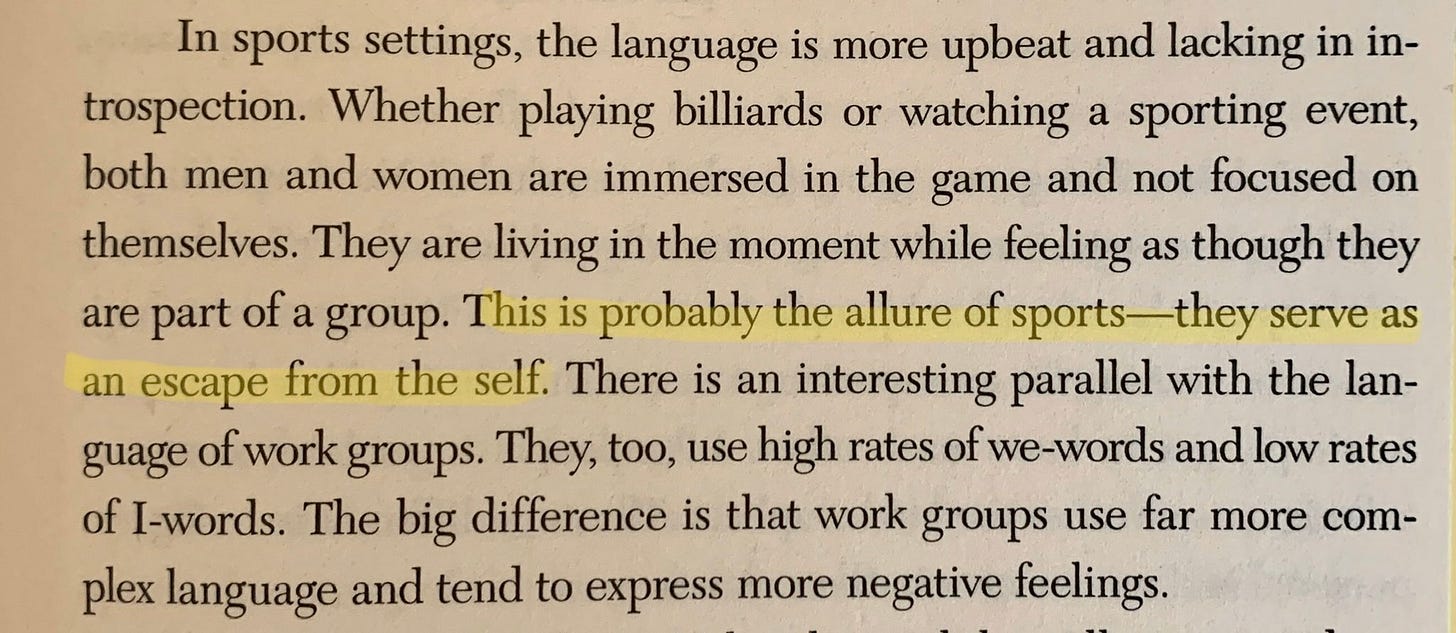
The book also deals with punctuation, which turns out to be one of the most reliable form of identifying marks in all of writing. If something can be said to be someone’s writing “fingerprint,” the closest candidate would be their use of punctuation:
“Punctuation marks can identify some people better than anything they write. In fact, when looking only at punctuation, computer programs identified 31 percent of authors correctly—essentially the same rate as relying on function words.”
We also reward certain types of thinking over others in school and work settings, as evidenced by the grading of exams and standardized tests. Those who think and write categorically (as opposed to social-emotionally) are generally graded higher.
“It wasn’t because the categorical thinker was a better writer. Rather, a categorical thinking style is more congruent with what we reward in college.” 👇
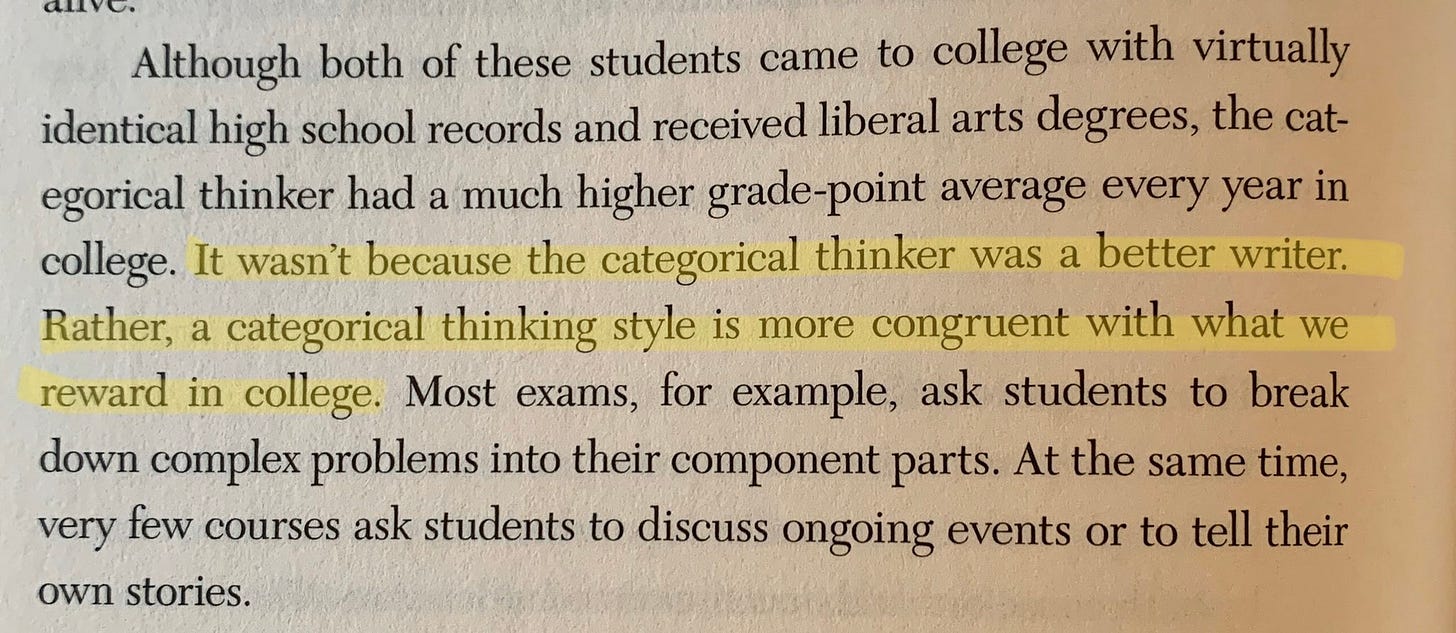
The opposite trend was seen in the context of community therapy settings, where social-emotional language was seen as more beneficial:
“It’s hard to imagine two studies more different than the college admissions and therapeutic community projects. Categorical thinking predicts better college grades for one group; social-emotional language predicts lower re-arrest rates in another.”
In the end, our language continuously reveals the ever-changing nature of our selves in different scenarios, over time:
“Different aspects of language are linked to different parts of our lives.”
(This is not an affiliate link, I get nothing if you buy it, but still… you might want to buy it. ☝️ )


